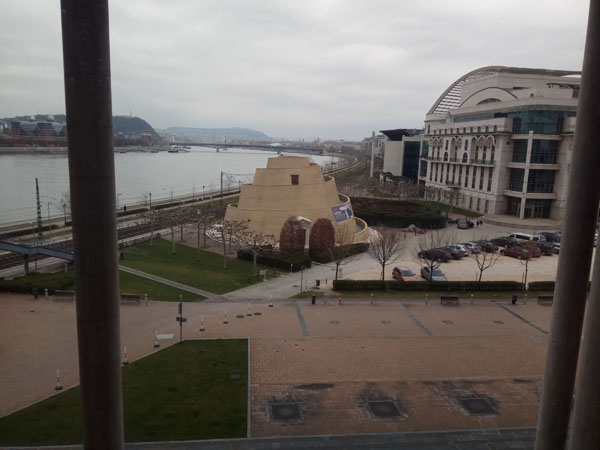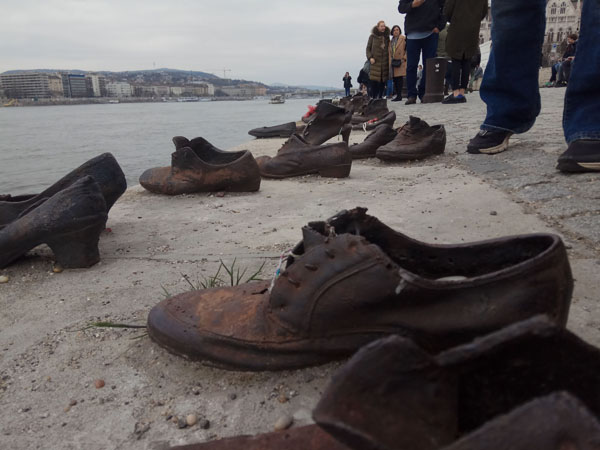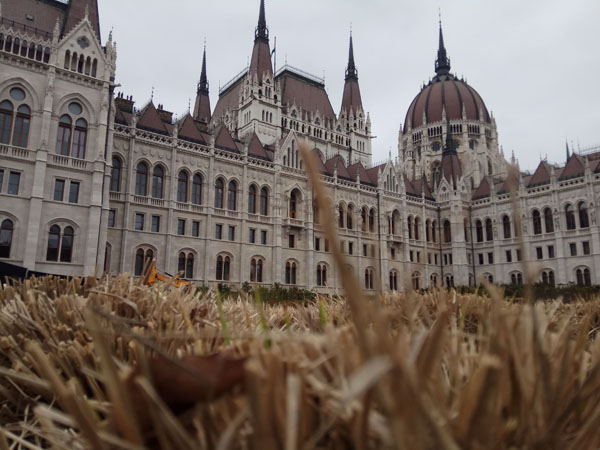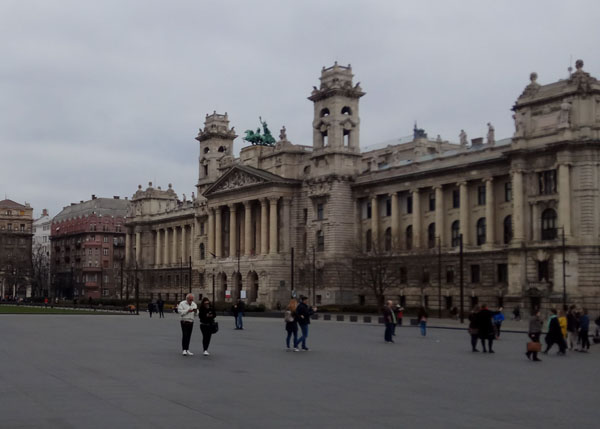|
|
|
iron shoes and pálinka
Saturday, April 7 2018
location: room 311, MS Joy, at dock 6 south of the Szabadság hid, Budapest, Hungary
Today we were required to vacate our rooms by 9:00am so they could be prepared for the next group of people cruising on the MS Joy (they would be a mostly-German group taking a non-vegan cruise upstream into Germany). There was still a breakfast available for us, though there was noticeably less attentiveness from the staff. We had, after all, already made our tipping decisions. Thinking ahead to the long flight back to North America, Gretchen made two little sandwiches and hoarded six vegan croissants, which had been one of the highlights of the cruise. The tour director had also alerted us to some leftover vegan "cheese" and even wine out in the entryway. It couldn't be used on the next cruise and so was available for free, though if one wanted to one could leave an anonymous donation to a European animal sanctuary.
Originally the plan was for Gretchen and me to leave our stuff at a hotel that the Scots would be staying at somewhere nearby so we could further explore Budapest unencumbered. But they couldn't check in until sometime this afternoon, so they wanted to stay on the boat as late as possible, and that was initially our plan. So we hung out in the boat's lounge with all the others waiting for their taxis. Gretchen took the opportunity to leave the boat to visit a nearby farmers' market, where she not only found peppers in a wide range of heat but also tiny bottles of pálinka, a Hungarian brandy that typically comes with a piece of apricot floating inside it. We'd been told that one hasn't been to Hungary unless one drinks some pálinka. It was a little early to start drinking, but when Gretchen is drinking it's probably okay. When Gretchen was returning to the boat, she had to negotiate her way past a somewhat intimidating bald-headed guy dressed in smart grey suit. He was part of the staff for the new crew that was in the process of taking over the MS Joy.
Gretchen and I sat with the Scots for awhile, telling them about our life in nature in Upstate New York and insisting they come visit us sometime. This reminded Gretchen of the time my Launch.co.uk colleague Frank from England visited us with his girlfriend Lisa and managed to see a bear (among other things). I joked that we still had the bear suit for the entertainment of other visitors. In the telling of that story, Gretchen mentioned the slight language difficulty we had in describing the territory around our house. Frank and Lisa had confused us by referring to the many acres of our forest as "the back garden." Garden, you see, in American English refers specifically to a place where plants are deliberately cultivated, while in British English it can mean any part of a land parcel that is not indoors. Kelly could see the confusion, and went on to say that in British English a "yard" is a small dismal place that is typically paved over completely. This led into a discussion of British terms like "half two" meaning "2:30." Kelly is actually English, though her husband Brian is a real Scot, and in Scotland they have an even more confusing time-telling pattern: "the back of X." In Scotland, this means after X, not before. It's so counterintuitive that Kelly never uses it.
Later Gretchen found that we could just leave our stuff on the boat until 2:00pm, which seemed like enough time to her for at least part of our day. As long as we retrieved our stuff before the boat set sail, all would be well. Happily, the boat would be leaving at 4:00pm, though we could only leave our stuff until 2:00. This meant even if we were a little late, the boat would still be at dock six in Budapest.
Gretchen wanted to go check out the Ludwig Art Museum, which was further south on the Danube (all the places we'd gone so far had been north of the Liberty Bridge). Though faire enforcement seems infrequent in Budapest, I thought it best to buy tickets so we could ride the tram legitimately. We're not poor anymore, and it would be worth it just to be able to ride the tram without anxiety (a feeling I experience much more intensely than Gretchen does, if she experiences it at all). But while we were waiting in line to buy tickets, some weird guy who was either very drunk or very high on an unfamiliar drug kind of drifted into my space and, weaving slowly back and forth, muttered something quietly at me in an unfamiliar language (of which there are many). Why me? Who knows, but Gretchen pulled me away, and the guy went and bothered some woman next. Meanwhile, an English-speaking couple in front of us in line couldn't figure out what to do, as this particular machine only negotiated business in Magyar. We ended up riding the tram to the museum for free. But I was hoping we wouldn't be doing that all day, and I spoke up to say that I wasn't finding the anxiety of riding the tram for free all that fun. But what could we do? At the tram's Ludwig Museum stop, there didn't appear to be ticket vending machines of any kind.
In the Ludwig, we spent most of our time walking through an exhibit of recent Ukrainian works inspired by the protests in 2013/2014 that ousted a corrupt Putin-backed (one could say "Trumpist") president and lead to the Russian invasion of the Crimea as well as the the ongoing conflict in the eastern Ukraine between irregular Russian-backed forces and Ukrainian nationalists. The most engaging of the works focused on the struggle artists have had just doing their art. There was, for example, a video installation showing surveillance footage of a Ukranian artist being roughed-up by either pro-Russian or neoNazi thugs. Another amazing installation was a room with clothes in clumps on the floor with animated humans projected onto them from above, allowing us to walk among the virtual wounded. I also appreciated a series of photographs documenting the destruction and desecration of old Soviet-era monuments in the Ukraine. The best of these showed the remains of a copper sculpture of a horse and rider. The only parts still intact were the heads and limbs; all the big flat pieces of copper had been salvaged by nearby villagers.
We also toured a more general gallery of modern art, which included a couple Picasso paintings and a Robert Rauschenberg sculpture.
I wasn't happy about riding back to the MS Joy on a tram with no ticket in my wallet. But Gretchen allayed some of my anxiety by suggesting ticket enforcement would be concentrated to times when lots of people were riding, not on a weekend.
The vaguely-menacing grey-suited baldheaded guy graciously let us board the MS Joy to recover our bags, and Gretchen gave a warm goodbye to the tall gorgeous woman who works its front desk. And then we caught another free on the tram, this time north towards (but not quite to) the Parliament. We got out early to walk the last five or six blocks so we could see a monument to the many Jews killed in Budapest during WWII. It's called Shoes on the Danube Bank, and helps us remember a brutal period in the war when a Nazi-aligned militia called the Arrow Cross systematically rounded up as many as 20,000 Jews, had them stand on the bank of the Danube, take off their shoes (which were considered a valuable resellable commodity) and then shot them into the river. Back when we'd been in Budapest over a week before, I'd actually seen the shoe monument from the tram and (not knowing at the time about the monument) couldn't tell if the brown objects I was seeing were shoes or brown-colored pigeons. On this Saturday, the monument was surprisingly crowded with people, many of them snapping pictures of the shoes. One had to get very close to them to see that they were not made of leather but were instead rusted iron bolted to the flagstones. Many contained pebbles, as it's a common practice for Jews to place stones on the graves of the dead, and this was the only grave that thousands would ever have. There was a plaque in Hungarian that I did my best to translate using my phone's offline dictionary. It mentioned the Arrow Cross, the victims, and the date. Gretchen wondered how anyone could be ordered to go to their own death. And why take off the shoes? Why not just jump? Ultimately, ours is an obedient species.
After sitting for awhile, we continued north to the Parliament, passing through the square (Kossuth tér) just to its east. A couple very serious-looking guards in uniformm stood near a flag pole holding guns equipped with bayonets. I saw one tourist pose next to one, taking advantage of the fact that he had to always be completely serious. They probably weren't the actual security on the square; whoever that was was probably happy when we continued east into the city with our heavy backpacks.
It was luppertime, and the only place I wanted to eat in Budapest was the Veganeria. So that was our next destination. Once again I ordered the gyros pizza, which I had with an cappuccino that turned out to be excellent. Gretchen wasn't yet 100%, so she ordered a plate of spaghetti and some sort of herbal tea. Given that it was mid-afternoon, the Veganeria was surprisingly busy. Perhaps the Hungarians are, like me, a lupper-loving people.
Evidently many of the buses in Budapest can be powered either by diesel engines or electricity from overhead wires. From upstairs in the Veganeria I could look down on them as they passed and notice that their wire-attaching hardware had been reeled in and they were running on diesel. Perhaps that is a weekend thing.
After lupper, we were done with Budapest and just wanted to pull the ripcord on the experience and go to the hotel. Gretchen had gotten a reservation at the Ibis Hotel, within walking distance of the Budapest Airport. But how to get to the Ibis Hotel? Gretchen's internet research indicated that taxis in Budapest are controlled by the mob and it would be hard to get a fair fare. But a little more research had revealed that there is a bus that can be taken from a nearby street all the way to the airport. All we'd have to do is take another, local bus to the big bus terminal, and catch the airport bus there. So that was what we did. The first bus was operated like a tram, meaning that again we rode without paying (and risked being asked by an authority figure for a ticket). At the bus terminal, the boarding of the bus to the airport was being handled by a whole staff of people. There was an official standing right next to the bus selling tickets and another to wave us into the bus. It was all so civilized and logical.
The Ibis Hotel is biggest cube-shaped building with decided rounded-corners. It's so new that it wasn't visible in the satellite view of Google Maps. To get there from where the bus dropped us off, all we had to do was walk across a medium-size parking lot. In the lobby, it seemed very clean and modern, in a Scandinavian sort of way. And of course they had adapters allowing me to plug my American-style laptop into a European-style outlet.
Our room was elegant and modern, though it was decidedly brutalist, featuring even a ceiling made of raw concrete. Tempering this somewhat was a design that had been stenciled onto it supposedly depicting SMS messages being folded up and made into paper airplanes. We were on the first floor, so the view wasn't great. But we were in an ugly part of the world, so it wouldn't have helped much to be higher up either. Fortunately, the airplanes were all on the other side of the airport building and we couldn't hear them at all.
Gretchen switched on the room's teevee and soon found herself hate-watching Son of the Dragon, as it was the only thing on. Son of the Dragon is a Hallmark Channel original series which sets The Thief of Baghdad in ancient China (perhaps because the Arab world itself was too controversial, at least for the Hallmark Channel, after 9Eleven). The acting was terrible, the special effects (some of which involved flying carpets) were unconvincing, and the writing was dreadful. Then, of course, there were cultural issues. Why were the heroes of this movie all white guys? And how were their martial arts skills better than those of the Asians? I think we have the answer for why Hallmark Channel is so popular among the Trump-voting demographic.
We had a whole bottle of white wine (bought in Belgrade) and a hard cider to dispose of before catching the plane tomorrow, so I busted both of them open. On the boat, I'd had a relatively easy job of opening a corked bottle of red wine. I'd used a phillips screwdriver to get a screw into the cork and then forced a flat part of the television mounting hardware against that head to pull it and the cork out. Here in the hotel room, though, the only solid flat piece of metal was a part of lamp, and it kept getting away from me every time I applied force, sometimes resulting in angry scratches in the lamp's annodized surface. Eventually I got the cork out of the bottle enough that I could do the rest of the work with my teeth, a process that understandably worried Gretchen.
The wine tasted terrible at room temperature, so I went in search of ice. The hotel had no ice machine, but the nice guy at the bar gave me some cubes in a cup, which did the trick.
When I opened up my laptop, I noticed that the crack that had only reached a third of the way across the screen now reached all the way across to a corner. The screen still worked perfectly fine, however.
[REDACTED]

View north up the Danube from the Ludwig Museum. Click to enlarge.

Shoes on the Danube Bank. Click to enlarge.

The gorgeous neo-gothic gingerbread of the Hungarian Parliament. Click to enlarge.

The neo-classical Néprajzi Museum (just east of the Parliament)
Click to enlarge.
For linking purposes this article's URL is:
http://asecular.com/blog.php?180407 feedback
previous | next |



